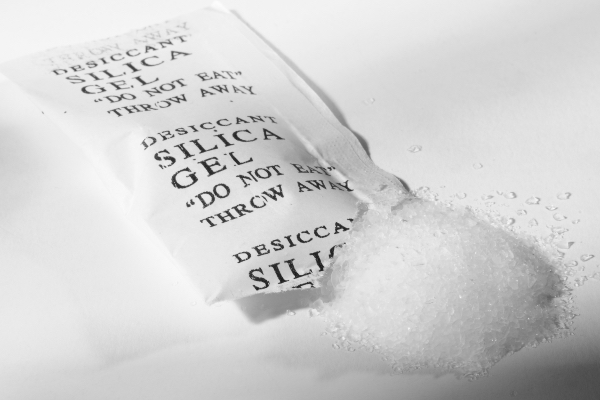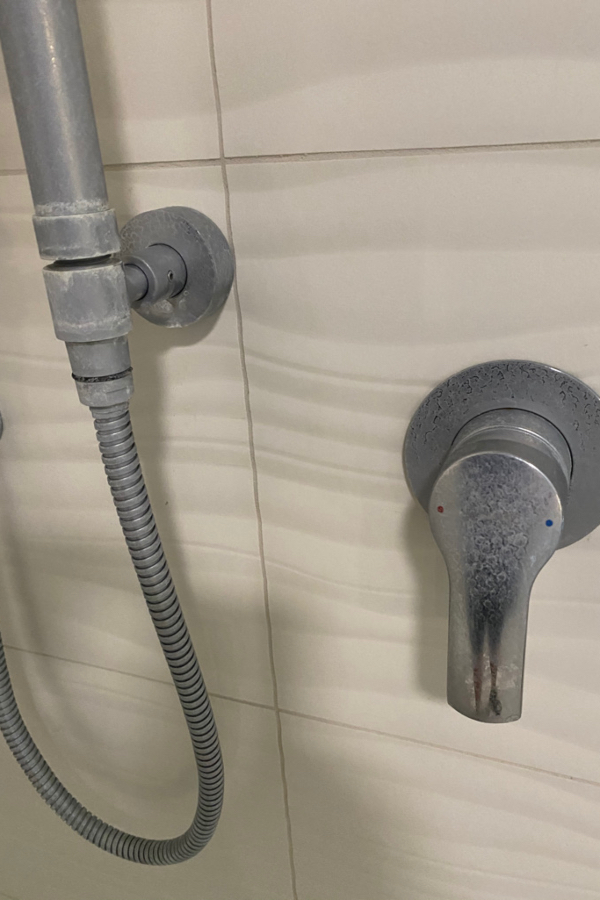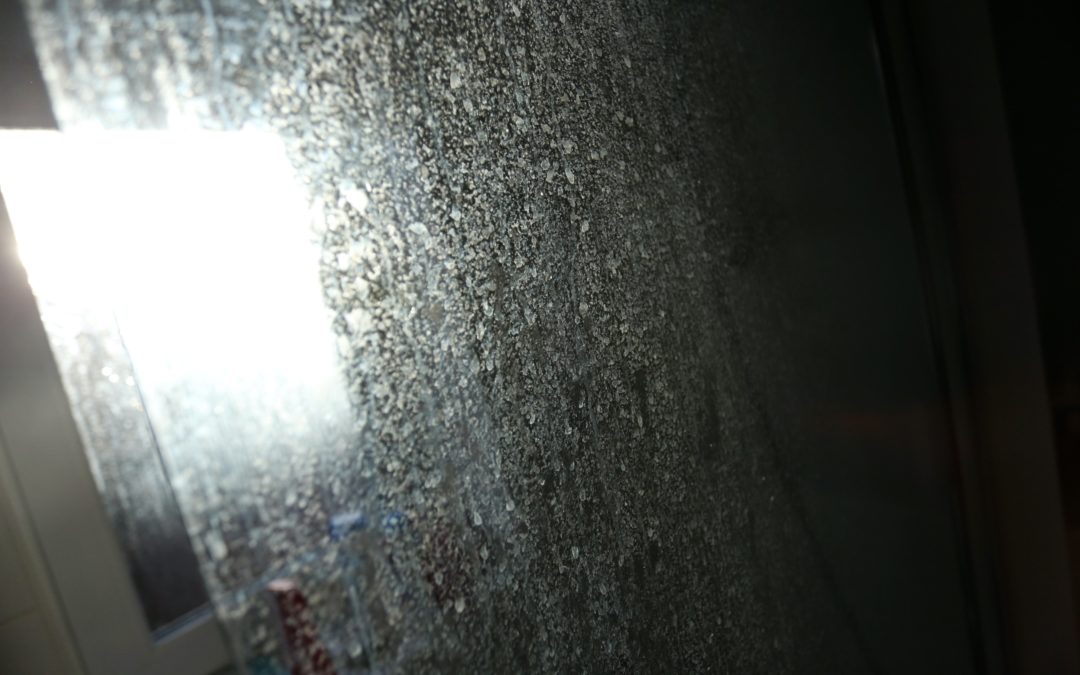Silica in mains water supply is an annoying problem. It leaves a haze & water spotting on crystal glass, bathroom fittings, porcelain, stainless steel, shower doors, tiles, and on cars. Why is that? And what can you do about it?
2nd most common component of the earth: Silicon dioxide.
Silicon dioxide, also called silica, is an inorganic compound with the molecular formula SiO2. It consists of two elements: silicon and oxygen. In terms of mass, silicon and oxygen are the most common elements on earth. With 48.9% of the earth’s mass, oxygen is in first place, ahead of silicon with approx—15% of the earth’s mass.
In nature, these minerals make up a large part found in the earth’s crust. Silica is most commonly found as quartz and in various living organisms. You can find it in some microorganisms, animals, and human bodies (human ligaments, cartilage, and muscle). But also plants (especially cereals) and drinking water can contain this mineral. All of this makes silica quite unique. But there is something else: its solubility. Silica is neither soluble in water nor organic solvents.
This has advantages but also disadvantages!

SiO2 plays an unnoticed role in many products in everyday life. These include its use, for example, in paints and varnishes as well as in plastics and adhesives. But also modern manufacturing processes in semiconductor technology or applications in pharmaceutical articles use this mineral.
It is also made in laboratories and is most commonly used as an anti-caking agent to keep powdered foods flowing and prevent moisture absorption.
Silica – a silent sidekick in our everyday lives
How safe is silicon dioxide (silica) for human consumption?
The FDA considers silicon dioxide in food to be generally safe for human consumption, provided consumed in small amounts. There is no evidence that the type of silica used in foods contributes to carcinogenesis. However, the Environmental Protection Agency has determined that the crystal-free form of silica poses a “minimal risk” to humans. A potential concern with nanoparticles in food, including silica, is that some research suggests they can trigger GI problems such as leaky gut syndrome and DNA and cell damage with prolonged ingestion. Currently, we do not know much about the long-term effects of regular consumption of nanoparticles. Therefore, it needs more research on these concerns.
Therefore, silica is also a food additive in baking powder, protein powder, sugar, salt and spices. Toothpaste, cement, synthetic rubber, or food products as thickeners, adsorbents, or fragrance carriers contain Nano-silica or micro-silica particles.
Is it harmful or dangerous to drink silica?
Silica is commonly found in the town water supply in Warkworth, Snell Beach, Algies Bay, and other Rodney District and Auckland places. The ultra-fine particles pose no danger to the human body. However, they lay down like a white film on fittings in the kitchen and bathroom, cause water spotting in the shower and on mirrors, or leave a grey haze/ water spotting on a freshly washed car.
The good news is that silica in drinking water poses no health risk when consumed. The problems with silica in water are primarily aesthetic. But here comes the bad news. Silica in water cannot be successfully removed conventionally by water softeners or ordinary water filters such as carbon filters. It is very stubborn and requires a well-tested water treatment approach to remove it in the long term.
Silica in mains water supply, a stubborn contemporary
Silica is a known problem in many parts of New Zealand, with households in Warkworth, Snell Beach and Algies Bay particularly suffering. But places like Orewa, Mill Water, Silverdale and Milldale in the North Auckland area have less of a problem as their water comes from Auckland’s dams and rivers. This hard, sand-like mineral passes through most water filters with ease. The microscopic particles deposit on smooth surfaces in your home and merge with them. A whitish, almost opaque film remains on the ceramics and fittings in the bathroom. Glassware in the kitchen, mirrors and shower doors become cloudy and can no longer be cleaned thoroughly.
The cloudiness worsens over time as the silica chemically etches into the glass and ceramics. Once the water evaporates on the surface and the silica is in direct contact with the glass, both instantly form a molecular bond. Since an essential ingredient in glass compositions is silica, the two components build a strong bond under the right circumstances. Once a molecular bond is formed, it is challenging to remove the residue from the glass completely. There will be a permanent haze on your glass and ceramic surfaces once the content reaches over 40 parts per million in the water.

Why do Warkworth, Snells Beach and Algies Bay have a problem with Silica in mains water supply?
As one of the main components of the Earth’s crust, siliceous compounds, which can be found in a large proportion of naturally occurring rocks, also played a significant role in water extraction. Not all raw water contains the same amount of Silica; it depends on how it is obtained. If you have a rainwater collection system or get your drinking water from a spring or borehole, this problem will thankfully not affect you. However, if you live in Warkworth, Snells Beach or Algies Bay, you are probably on town water supply. Monitoring water quality in the drinking water plant is crucial. However, the current silica levels in mains water meet NZ Drinking Water Standards 2005 (revised 2018). There is no maximum level set for Silica.
It is complicated to remove Silica from water, and as it is not a health hazard, the councils usually are not doing anything about it. So if you are on mains, you will have to take action yourself if that pesky “white film” is bothering you at home.
The good news is: Aqua Works knows what works with reducing the effects of Silica in water!
Our experienced service team will come to your home and obtain an overview on site. First, we check whether the white film on glasses and mirrors, the water spotting in your shower and bathroom fittings and the grey film on your car are not caused by heavy metals such as calcium or magnesium deposits. Then we can make recommendations to reduce the silica effects.
Aqua Works puts an end to pesky streaks on glasses, water spotting in your shower and a grey haze on the car.
Silica settles preferentially on all surfaces that are in contact with steam. There it becomes a solid layer, which on the one hand, is an aesthetic nuisance, but on the other hand, can also lead to blockages. This is why this white coating is a significant problem, especially in kitchens, bathrooms, and industrial applications. Removing silica deposits with chemical or mechanical processes can cost valuable time and resources.
Aqua Works looks back on 20 years of experience in the field of water treatment and contaminant removal. As local water filtration specialists, we know the Rodney and Auckland area like the back of our hands and understand the regional problems and needs of residents. Based on our experience and leading technologies on the market we have developed appropriate solutions for our customers in Warkworth, Snells Beach and Algies Bay that suffer from Silica in water.
Removing Silica from your mains water supply
At Aqua Works, we know from our long term experience that there is no simple answer to the question: How to remove silica from water. However, our experts have found an effective solution for households in Warkworth, Snells Beach and Algies Bay. We have been testing this particular product for the last ten years and making changes to optimise it according to local requirements. So today, we are achieving the best results for your problems with silica in water. It is a multi-process built into a water treatment system that we use for residential homes. This whole house solution gives you the ability to remove silica from your local mains water supply and successfully reduce deposits from glass and ceramic surfaces in your home.
Call us on 0800 Aqua Works to arrange an on-site appointment, and we will show you how to lift the grey haze from your home. In addition, we have developed other applications for commercial businesses to remove silica in water successfully. Our service team will come to your premises to discuss appropriate solutions for your individual needs.


